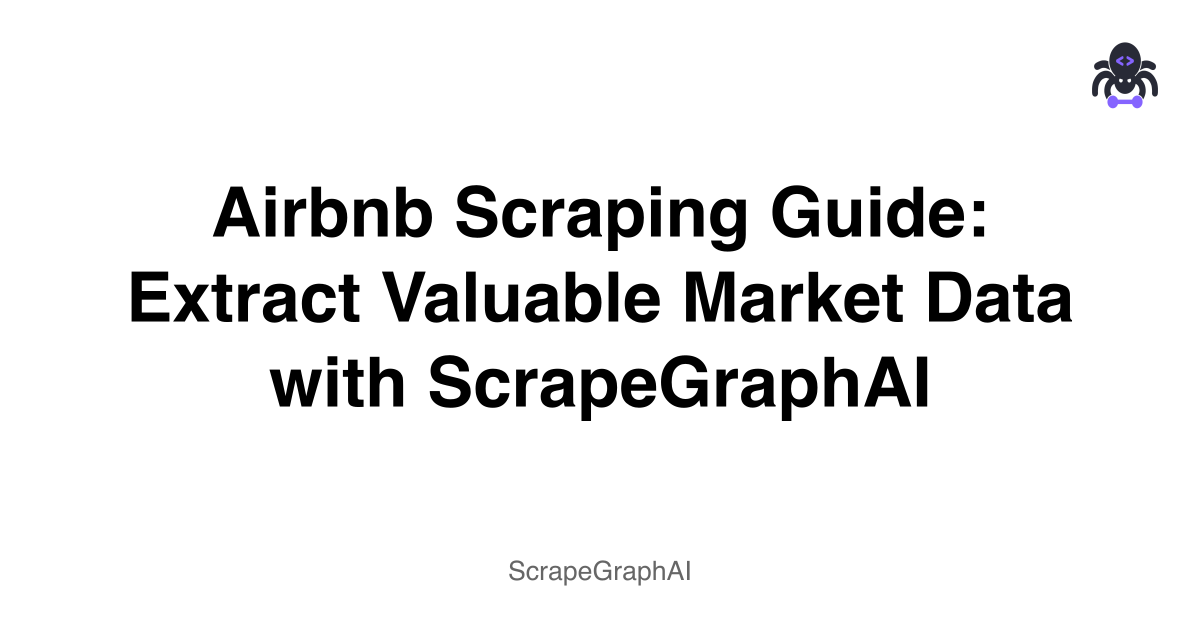Scraping websites like Airbnb can unlock powerful insights for businesses, analysts, and travel startups. With ScrapeGraphAI, extracting structured data from complex, dynamic web pages becomes incredibly easy—even from platforms like Airbnb that are traditionally tricky to scrape.
In this post, we'll show you how to scrape data from an Airbnb listing, what kind of information you can extract, and why this is useful across various industries.
🚀 Why Scrape Airbnb?
Airbnb listings contain a wealth of valuable data, including:
- Property names and locations
- Amenities and features
- Pricing trends
- Reviews and host reputation
- Availability over time
Scraping this data can power:
🧠 Market Intelligence
Real estate investors and travel companies can analyze location trends, pricing fluctuations, and amenity distributions to make better business decisions.
🌍 Travel Aggregators & Meta-Search Engines
Build your own Airbnb comparison tool! Pull data from multiple listings, combine it with other sources, and provide better discovery and filtering.
📊 Competitor Analysis
Hosts and property managers can monitor competitors' offerings, pricing, and guest experiences to optimize their own listings.
📚 Academic and Urban Research
Researchers studying tourism, urban development, or remote work trends can collect large datasets to understand regional impacts and growth patterns.
🧠 Scraping Airbnb Data with ScrapeGraphAI
Here's a real example using ScrapeGraphAI to extract information from an Airbnb listing.
from scrapegraph_py import Client
from scrapegraph_py.logger import sgai_logger
sgai_logger.set_logging(level="INFO")
# Initialize the client
sgai_client = Client(api_key="sgai-********************")
# SmartScraper request
response = sgai_client.smartscraper(
website_url="https://www.airbnb.it/rooms/840287868247188587?category_tag=Tag%3A5348...",
user_prompt="Extract me the name, position, amenities "
)
# Print the response
print(f"Request ID: {response['request_id']}")
print(f"Result: {response['result']}")
sgai_client.close()🧾 Output Example
{
"name": "Home in San Martino in Badia",
"position": "San Martino in Badia, Trentino-Alto Adige, Italy",
"amenities": [
"Garden view",
"Mountain view",
"Hair dryer",
"...",
"Self check-in",
"Building staff"
]
}With just a URL and a plain-language prompt, ScrapeGraphAI takes care of rendering the page, analyzing the layout, interpreting your instructions, and returning structured data. No XPath or complex selectors needed.
💡 Final Thoughts
ScrapeGraphAI turns web scraping into an intelligent, language-driven process. You no longer need to write brittle scraping scripts that break with every UI update. Instead, just describe what you want—and get the data you need.
Whether you're a data scientist, startup founder, or digital nomad analyzing remote-friendly homes, ScrapeGraphAI can be your gateway to structured Airbnb data.
Frequently Asked Questions
What data can I extract from Airbnb listings?
Available data includes:
- Property details and descriptions
- Pricing information
- Location data
- Host information
- Amenities lists
- Review content
- Availability calendars
- Booking policies
How can I use Airbnb data effectively?
Data applications include:
- Market analysis
- Price optimization
- Competitor monitoring
- Investment research
- Travel planning
- Academic studies
- Business intelligence
- Trend analysis
Is scraping Airbnb legal?
Web scraping legality depends on:
- Terms of service compliance
- Data usage purpose
- Local regulations
- Privacy considerations
- Commercial vs personal use
- Data protection laws
Always consult legal advice for your specific use case.
What are the technical challenges?
Common challenges include:
- Dynamic content loading
- Anti-bot measures
- Rate limiting
- Session management
- Geographic restrictions
- Data structure changes
How does ScrapeGraphAI handle these challenges?
ScrapeGraphAI addresses challenges through:
- AI-powered adaptation
- Automatic structure detection
- JavaScript rendering
- Smart retry logic
- Natural language processing
- Context understanding
What industries benefit from Airbnb data?
Industries include:
- Real estate
- Hospitality
- Travel agencies
- Market research
- Urban planning
- Academic research
- Investment firms
- Property management
How often should I scrape data?
Frequency depends on:
- Data volatility
- Business needs
- API limitations
- Resource availability
- Legal considerations
- Update requirements
Can I scrape multiple listings?
Yes, you can:
- Batch process URLs
- Implement pagination
- Use concurrent requests
- Schedule regular updates
- Monitor changes
- Build databases
What formats can I export data to?
Common formats include:
- JSON
- CSV
- Excel
- Database
- API endpoints
- Data warehouses
How accurate is the extracted data?
Accuracy factors include:
- Page structure
- Content complexity
- Prompt clarity
- AI model capability
- Data validation
- Error handling
Related Resources
Want to learn more about web scraping for travel and real estate data? Explore these guides:
- Web Scraping 101 - Master the basics of web scraping
- E-commerce Scraping - Learn about scraping online marketplaces
- Real Estate Scraping - Extract property data effectively
- Booking.com Scraping - Scrape hotel and accommodation data
- Kayak API Integration - Work with travel aggregator data
- Price Monitoring - Track pricing across platforms
- AI Web Scraping - Advanced AI scraping techniques
- Structured Data Extraction - Handle complex data structures
These resources will help you understand how to effectively extract and utilize travel and accommodation data for your projects.
